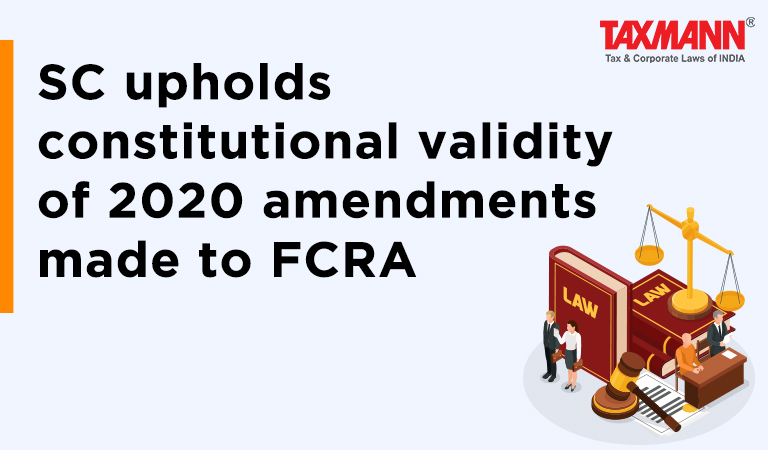SC upholds constitutional validity of 2020 amendments made to FCRA
- Blog|News|FEMA & Banking|
- 3 Min Read
- By Taxmann
- |
- Last Updated on 12 April, 2022

Case Details: Noel Harper v. Union of India - [2022] 137 taxmann.com 130 (SC)
Judiciary and Counsel Details
-
- A. M. Khanwilkar, Dinesh Maheshwari and C.T. Ravikumar, JJ.
Facts of the Case
In the instant case, petitions were filed under Article 32 of the Constitution of India assailing the constitutional validity of the amendments to the provisions of the Foreign Contribution (Regulation) Act, 2010 vide the Foreign Contribution (Regulation) Amendment Act, 2020.
The case of the petitioner was that Sections 7, 12(1A), 12A, and 17(1), were manifestly arbitrary, unreasonable, and impinging upon the fundamental rights guaranteed to the petitioners under Articles 14, 19, and 21 of the Constitution.
The Amendments are summarized hereunder:
(a) Amendment to Section 7: The amendment prohibited transferring the funds by the NGO which has received foreign funds to other NGOs in India, even when the receiving NGO, itself having FCRA registration.
(b) Insertion of Section 12(1A) : Section 2(1A) envisaged that every person who makes an application under subSection (1) of Section 12 is obliged/required to open FCRA account in the manner specified in Section 17 and mention details of such account in his application
(c) Insertion of section 12A: Section 12A mandated that the person concerned who seeks prior permission or prior approval under Section 11, or makes an application for grant of certificate under Section 12, including for renewal of certificate under Section 16, to provide as identification document, the Aadhaar number of all its office bearers or Directors or other key functionaries.
(d) Amendment to Section 17: Section 17(1) mandated opening of “FCRA account” and receiving of foreign contribution only at one bank at New Delhi, i.e., New Delhi Main Branch of the State Bank of India, 11, Sansad Marg, New Delhi.
Upholding the constitutional validity of the FCRA 2020 Amendments, the Supreme Court held that Sections 7, 12(1A), 12A and 17 of the 2010 Act are intra vires the Constitution and the Principal Act (FCRA, 2010). The Supreme Court credited the Parliament for having taken recourse to corrective dispensation for eradicating the mischief, which any sovereign country can ill-afford.
The Court said that merely because the registered association has been compelled to open FCRA account in the designated bank at the centralised location for receipt/inflow of foreign contribution from foreign source, it does not follow that such a requirement would be manifestly arbitrary or unreasonable.
It is only a one-time exercise to be complied with for availing the permission accorded by the Central Government under the Act to be a certified association or person given permission to receive foreign contribution as a precondition. Therefore, sections 12(1A) and 17 are not violative of Articles 14, 19 and 21 of the Constitution
The amended Section 7 of FCRA postulates complete prohibition on the transfer of foreign contribution to other person – not even to a person having certificate of registration under the Act. In other words, a person who is registered and granted a certificate or has obtained prior permission under the Act to receive foreign contribution will henceforth be required to utilise the amount “itself” and not through any other person.
The legislative intent is to introduce strict dispensation qua the recipient of foreign contribution to utilise the same “itself” for the purposes for which it has been permitted as per the certificate of registration or permission granted under the Act by the Central Government.
Supreme Court Held
Hon’ble Court held that Section 12A to be read down and construed as permitting the key functionaries/office bearers of the applicant (associations/NGOs) who are Indian nationals, to produce Indian Passport for the purpose of their identification(like foreign nationals functionaries are allowed to produce their Passports for same purpose. That shall be regarded as substantial compliance of the mandate in Section 12A concerning identification.
Disclaimer: The content/information published on the website is only for general information of the user and shall not be construed as legal advice. While the Taxmann has exercised reasonable efforts to ensure the veracity of information/content published, Taxmann shall be under no liability in any manner whatsoever for incorrect information, if any.

Taxmann Publications has a dedicated in-house Research & Editorial Team. This team consists of a team of Chartered Accountants, Company Secretaries, and Lawyers. This team works under the guidance and supervision of editor-in-chief Mr Rakesh Bhargava.
The Research and Editorial Team is responsible for developing reliable and accurate content for the readers. The team follows the six-sigma approach to achieve the benchmark of zero error in its publications and research platforms. The team ensures that the following publication guidelines are thoroughly followed while developing the content:
- The statutory material is obtained only from the authorized and reliable sources
- All the latest developments in the judicial and legislative fields are covered
- Prepare the analytical write-ups on current, controversial, and important issues to help the readers to understand the concept and its implications
- Every content published by Taxmann is complete, accurate and lucid
- All evidence-based statements are supported with proper reference to Section, Circular No., Notification No. or citations
- The golden rules of grammar, style and consistency are thoroughly followed
- Font and size that’s easy to read and remain consistent across all imprint and digital publications are applied



 CA | CS | CMA
CA | CS | CMA
